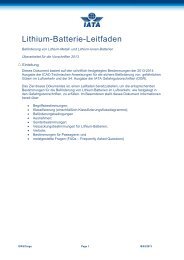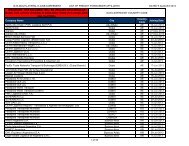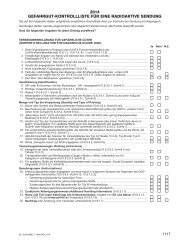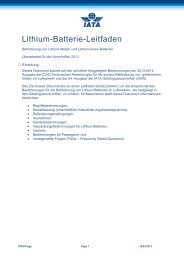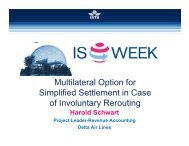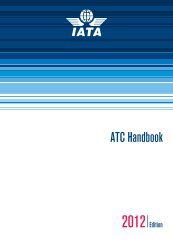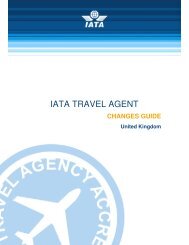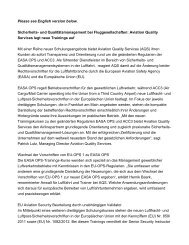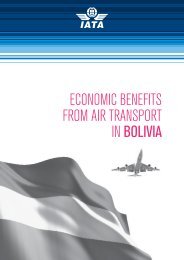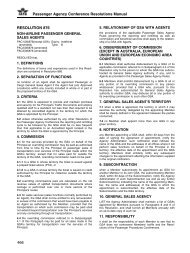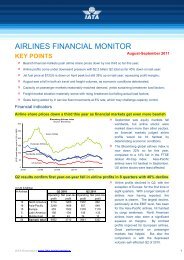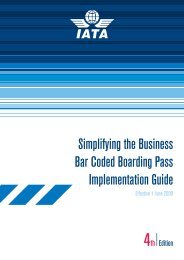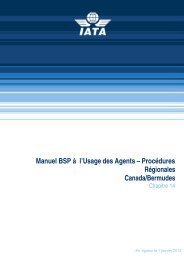Economic Regulation - IATA
Economic Regulation - IATA
Economic Regulation - IATA
Create successful ePaper yourself
Turn your PDF publications into a flip-book with our unique Google optimized e-Paper software.
06 - <strong>Economic</strong> <strong>Regulation</strong> 43<br />
New Zealand<br />
The high cost of regulation itself.<br />
Price-cap regulation was considered to be too intrusive<br />
and too much of a financial burden. The ACCC had a<br />
detailed involvement; it could collect information on costs,<br />
profits and prices and report publicly on the results of its<br />
findings. However, the system could have been altered<br />
rather than removed in order to minimise regulatory costs<br />
while still taking account of the benefit it can provide to<br />
all stakeholders.<br />
The price monitoring regulatory regime is based upon<br />
the PC’s assessments of airport market power. These<br />
assessments focus primarily on the ability for airlines,<br />
or their passengers, to substitute away from the<br />
services provided by the airport (towards another airport,<br />
another destination or another mode of transport). The<br />
reasonableness of charges is typically assessed with<br />
reference to costs incurred, providing poor incentives for<br />
cost minimisation. Price monitoring does allow the effects<br />
of external events to be taken into account, but this can<br />
be more of a one-way process, with little incentive for<br />
airports to pass on any positive external impacts to users.<br />
Price monitoring has reduced regulatory costs, but at the<br />
expense of higher user charges and unjustified upward<br />
revaluations of asset bases at several of the airports.<br />
While well below true monopoly levels, user charges<br />
are undoubtedly higher than they would have been<br />
under tighter regulation, especially at Sydney airport.<br />
The government still has the right to re-impose pricecap<br />
regulation in the event of poor performance, but the<br />
definition of poor performance has not been made clear.<br />
The threat also does not appear to be credible. Despite<br />
clear evidence of price rises, the PC argues that there has<br />
been no misuse of market power without fully explaining<br />
at what level market power would be considered to have<br />
been misused. The consistent failure to provide definitive<br />
criteria for market power and its misuse undermines the<br />
credibility of the system.<br />
In the late 1990s the New Zealand government partiallyprivatised<br />
Auckland and Wellington airports and changed<br />
the structure of Christchurch airport to operate on a full<br />
commercial basis. A light-handed price monitoring regime<br />
was introduced at the time of these changes. However,<br />
the government does retain the right to implement<br />
price-cap regulation at its discretion. The system is also<br />
supported by a number of other domestic regulations<br />
that impact upon airports (e.g. the Commerce Act).<br />
The light-handed regulatory regime has turned out to<br />
be both controversial and costly. Airlines have frequently<br />
been forced to take legal action over actions by airports.<br />
In addition, as in Australia, the system does not have a<br />
credible threat in the case of abuse of market power.<br />
The NZ Commerce Commission recommended in 2002<br />
that Auckland airport should face price-cap regulation.<br />
However, no change has been made, with the proposal<br />
rejected by the NZ Commerce Minister in 2003 on the<br />
grounds of too high a cost for regulation.<br />
Under the current system, Auckland airport generates<br />
exceptional profits both on a regional and global<br />
comparison. Its Earnings Before Interest and Taxation<br />
(EBIT) margin was 66% in its fiscal year 2006, by far the<br />
highest EBIT level among the top 50 airports in the world.<br />
In addition, it has revalued its asset base and used its<br />
market power to increase airline charges. If fully applied,<br />
airline charges could increase by over 50%, despite<br />
using the same assets and with no change in efficiency<br />
or service quality.<br />
Indeed, the vague principles on which light handed<br />
regulation is based create a strong risk that the system<br />
will revert to a cost-plus type of regulation, reducing<br />
the incentives for efficiency improvements 20 . This is<br />
an important consideration for other governments in<br />
the region who are considering implementing a similar<br />
system, such as Papua New Guinea and Fiji.<br />
20<br />
See P. Forsyth, “Airport Policy in Australia and New Zealand: Privatisation, Light Handed <strong>Regulation</strong> and Performance”, presented at the<br />
Fundacion Rafael del Pino conference, Madrid, September 2006.



